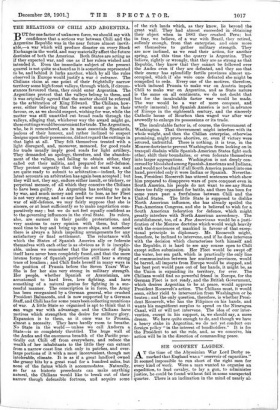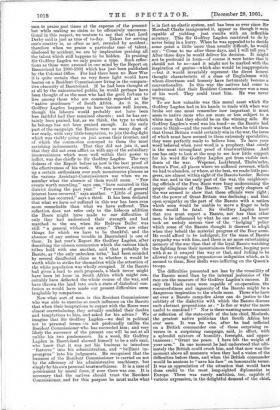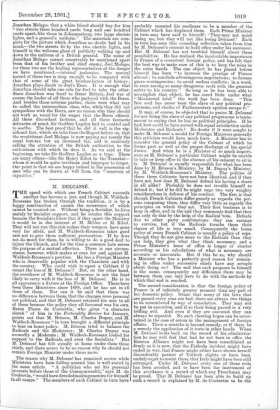SIR GODFREY LAGDEN.
AT the time of the A.byssinian War Lord Derby re. marked that England. was a" reservoir of capacities." It seemed impossible to run short of the right men for every kind. of work. Were a man wanted to organise an expedition, to lead cavalry, to lay a gun, to administer justice, he could be found. without fail in some unexpected quarter. _There is an inclination in the mind of nearly au men to praise past times at the expense of the present. but while making no claim to be offensively unconven- tional in this respect, we venture to say that what Lord Derby said is just as true of to-day. Talent for serving one's country is, as often as not, revealed by accident; therefore when we praise a particular case of talent, disclosed by accident, we are by implication praising all the talent which still happens to be hidden. In. praising Sir Godfrey Lagden we only praise a type. Such reflec- tions as these were aroused in our mind by the Report on Basutoland for 1900-1901 which has just been published by the Colonial Office. For had there been no Boer War it is quite certain that no very fierce light would have beaten on a Resident Commissioner living in the compara- tive obscurity of Basutoland. If he had been thought of at all by the uninstructed public, he would perhaps have been thought of as the man who had the good fortune to live among those who are commonly regarded as the "native gentlemen" of South Africa. As it is, Sir Godfrey Lagden happens to have become well known, though his labours would probably not have been less faithful had they remained obscure ; and he has cer- tainly been praised, but, as we think, the type to which he belongs has not been praised enough. In the early part of the campaign the Basuto were so many dogs of war ready, with very little temptation, to join the dog-fight which was visibly going on just across their frontier, and. of which the commotion conveyed to them the most ravishing inducements. That they did not join it, and. that they did not even afflict us with any of the subsidiary inconveniences which were well within their power to inflict, was due chiefly to Sir Godfrey Lagden. The very dulness of the Report before us now is the best proof of the effectiveness of his work. We can, however, summon up a certain enthusiasm over such monotonous phrases as the various Assistant-Commissioners use when we re- member what the absence of them would mean. "Few events worth recording," says one, "have occurred in this district during the past year." "Few events of general interest have occurred," says another. "Little of general interest has occurred," says a third. It has been declared that what we have not suffered in this war has been even more remarkable than what we have suffered. This reflection does not refer only to the hideous addition the Boers might have made to our difficulties if only they had understood their strength and had marched to the sea when Sir Redvers Buller was still "a general without an army." There are other things for which we have to be thankful, and the absence of any serious trouble in Basutoland is one of them. In last year's Report Sir Godfrey Lagden, after describing the unseen communion which the various black tribes hold with one another, said that probably the Basuto, as "the only unbroken tribe," had been sounded by several disaffected clans as to whether it would be worth while to strike for themselves while the attention of the white population was wholly occupied. If the Basuto had given a lead to such proposals, a black terror might have been let loose in South Africa which might con- ceivably have deflected the whole course of the war, and have thrown the land into such a state of diabolical con- fusion as would have made our present difficulties seem laughable by comparison.
Now what sort of man is this Resident Commissioner who was able to exercise so much influence on the Basuto that when their temptations to coquet with the Boers were almost overwhelming, they actually confided their doubts and temptations to him, and asked for his advice ? We imagine that Sir Godfrey Lagden—we deal in political not in personal terms—is not profoundly unlike the Resident Commissioner who has succeeded him; and very likely the successor of the present one will be not at all unlike his two predecessors. In a word, Sir. Godfrey Lagden in Basutoland showed himself to be a safe man, who knew that it was not his business to introduce " features " into his administration, and "brilliant im- promptus" into his judgments. He recognised that the business of the Resident Commissioner is carried on not by the efficiency of his administrative machinery, but simply by his own personal trustworthiness. It is a case of government by moral force, if ever there was one. It is necessary that the natives should trust the Resident Commissioner, and for this purpose he must make what is in fact an elastic syetem, and has been so ever since Sir Marshall Clarke inaugurated it, appear as though it were capable of yielding just insults with an inflexible accuracy. This Sir Godfrey Lagden contrived to do by never being in a hurry. When he was appealed to to decide some point a little more than usually difficult, he would. say : "Come to me after three days, and. I will tell you." After three days he would deliver his decision. It might not be profound in form—of course it were better that it should not be so—and it might not be marked with the inspiration of genius—which also would be inappropriate —but it would invariably represent the direct honest thought characteristic of a class of Englishmen with whom directness and honesty have fortunately become a conventionality. In this way the natives had come to understand that their Resident Commissioner was a man of his word. They could trust him. He was never wrong.
To see how valuable was this moral asset which Sir Godfrey Lagden had in his hands to trade with when war broke out one must remember how important it must seem to native races who are more or less subject to a, white race that they should be on the winning side. Sir Godfrey Lagden's word was his bond—so the Basuto had. come to think—and. the result was that when he told them that Great Britain would certainly win in the war, the issue of which must have seemed to them extremely speculative, they were perfectly ready to believe him. To have your word believed when your word is a prophecy, that surely is the most triumphant proof of trustworthiness. And one has only to look at the map to see how little support for his word Sir Godfrey Lagden got from visible inci- dents of the war. Wepener, Ladybrand, Thaba'nchu, Sanna's Post, all places where we suffered reverses, which we had to abandon, or where, at the best, we made little pro- gress, are almost within sight of the Basuto border. Before the war, and in the early part of the war, the neighbour- ing officials of the Free State were busy undermining the proper allegiance of the Basuto. The early chapters of the war seemed to show that these officials were right ; that the power of Great Britain was declining ; and that open sympathy on the part of the Basuto with a nation which soon would be unable to move a finger to help them would be fatal. Sir Godfrey Lagden blew that you must expect a Basuto, not less than other men, to be influenced by what he can see ; and he never took an unduly serious view of the " hedging " policy. which some of the Basuto thought it discreet to adopt when they beheld the material progress of the Boer arms. He could afford to be indulgent, for the mass of Basuto sympathy was with him, and there is no more entertaining memory of the war than that of the loyal Basuto watching the fighting from their mountainous frontier, keeping pace with it as it swayed. this way or that, and itching to be allowed to avenge the preposterous indignities which, as it seemed to them, Boer shells were inflicting on the Queen's troops.
The difficulties presented not less by the versatility of the Basuto mind. than by the internal jealousies of the race are the measure of Sir Godfrey Lagden's success. If only the black races were capable of co-operation, the resourcefulness and ingenuity of the Basuto might be a dangerous inspiration to the whole mass. Those who have sat over a Basuto camp-fire alone can do justice to the subtlety of the dialectics with which the Basuto discuss such abstract propositions as : "Is fire or water the more useful to mankind ? " Nor is there wanting some remnant or reflection of the state-craft of the late chief, Moshesh, the greatest native politician that South Africa has ever seen. It was he who, after he had inflicted on a British commander one of those surprising re- verses in a surprising campaign, said, in effect, with a splendid mixture of humility, foresight, and oppor- tuneness: "Grant me peace. I have felt the weight of your arm." In one moment he had understood that ulti- mately the British could crush him, and that now was the moment above all moments when they had a vision of the difficulties before them, and when the British commander would be anxious to "save his face" on honourable terms. It was an appreciation of the situation that would have done credit to the most long-sighted diplomatist in Europe. There was surely ambition, too, capable of various expression, in the delightful demand of the chief, Jonathan Molapo, that a white friend should buy for him "two streets three hundred yards long and one hundred yards apart, like those in Johannesburg, two large electric lights, and a general's uniform." The materials are com- plete for the picture which Jonathan no doubt had in his mind,—the two streets lit by the two electric lights, and himself in the welcome glare of publicity walking up and down in the uniform of a British general. The name of Jonathan Molapo cannot conceivably be mentioned apart from that of his brother and chief enemy, Joel Molapo, for these two are the leading representatives of the danger we have mentioned,—internal jealousies. The mutual hatred of these two is deep enough to be compared with that of some of the great brother-haters of history ; Jonathan plays Jacob to Joel's Esau. It is enough that Jonathan should take one side for Joel to take the other. Since Jonathan was loyal to Great Britain, Joel was of course the leader of all those who parleyed with the Boers. And. besides these extreme parties, there were what may be called the intermediate class, who, while they did not sympathise with the Boers, saw no reason why they should not work as usual for the wages that the Boers offered. All these discordant factions, and all these fantastic delicacies of mind, Sir Godfrey Lagden had to control and to soothe. The best proof that he did it well is the sig- nificant fact, which we take from the Report before us, that the recalcitrant Joel Molapo is now paying not merely the usual hut-tax but an increased tax, and is anxiously calling the attention of the British ,authorities to the enthusiasm with which he does it. As we said at the beginning, we take Sir Godfrey Lagden as a type. There are many others—like Sir Henry Elliot in the Transkei— whom it would be quite invidious and improper to forget. Our point is that we are happy indeed in the possession of men who can be drawn at will from the "reservoir of capacities."




































 Previous page
Previous page